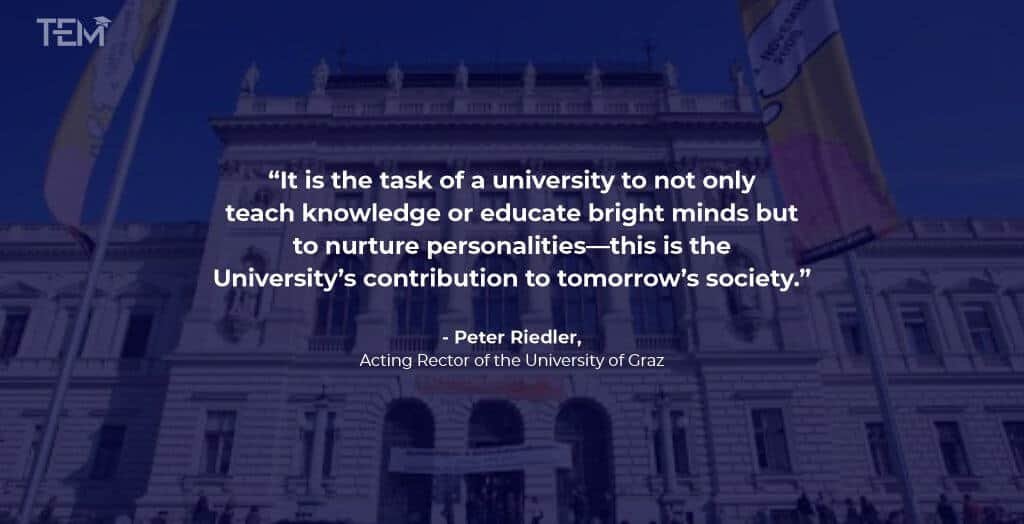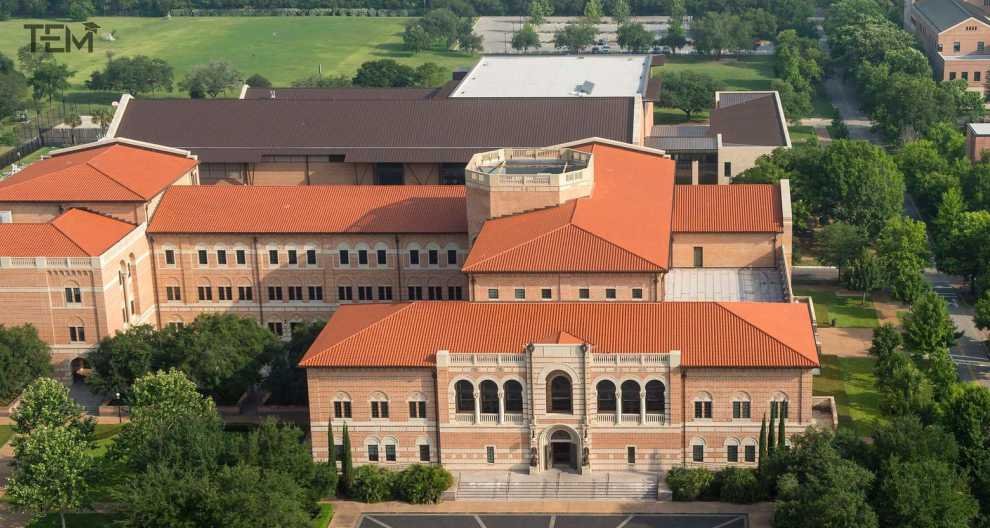The importance of high-quality higher education has increased by multiple folds over the past few decades. Alongside providing the opportunity to get a well-paid job at a reputed organization, quality higher education equips students with all the quintessential skills required to thrive in the competitive marketplace. Thus, today’s students seek prominent higher education institutes that cater to their academic as well as personal needs and make them industry-ready.
Located in Styria, Austria, the University of Graz is one such esteemed institute that has been developing the next generation of graduates who are adept in their respective fields. The university regards itself as an international institution for education and research committed to research and teaching for the benefit of society.
A Reputation of Excellence
Founded in 1585, the University of Graz is Austria’s second-oldest university and one of the largest in the country. Over the years, prominent scientists including six Nobel Prize winners—Fritz Pregl, Julius Wagner von Jauregg, Erwin Schrodinger, Otto Loewi, Victor F. Hess, and Karl von Frisch—have taught and researched at the university.
With 31,000 students and 4,300 employees, the university makes a significant contribution to the vibrant life of Graz city. Its geographical location favors a lively scientific, economic, and cultural exchange with south-eastern Europe. This benefits the city as well as its educational institutions.
Robust Vision and Core Values
The University of Graz is passionate about taking its far-reaching impact seriously and is well aware of the transformative power that universities hold. “We work for tomorrow” is the slogan that lies at the university’s research and teaching and portrays the many values it cherishes.
Research and research-oriented teaching are the prominent factors that distinguish the University of Graz from other institutions. The university believes that critical thinking fuels the future. It examines the past, reflects on the present, and devises solutions for the future.
Bouquet of Academic Programs
Today, the University of Graz has six faculties namely—Environmental and Regional Sciences and Education; Natural Sciences; Arts and Humanities; Law; Business, Economics, and Social Sciences; and Catholic Theology. It offers more than 120 Bachelor, Master, and Ph.D. programs. Some of these programs include,
- Bachelor’s Programs: Ancient History and Classical Antiquities, Art History, Business Administration, Classical Philology, Environmental Systems Sciences, European Ethnology, Molecular Biology, Sociology, Earth Sciences, Romance Studies, etc. as well as several programs for teaching subjects
- Master’s Programs: Advanced Materials Science, Applied Ethics, Archeology, Biotechnology, English and American Studies, Geosciences, Inclusive Education, Linguistics, Political and Empirical Economics, Digital Humanities, etc. as well as several programs for teaching subjects
- Doctoral Programs: Humanities, Natural Sciences, Law, Religious Studies and Sociocultural Discourse, Social and Economic Sciences, Philosophy, Catholic Theology, as well as several interdisciplinary programs
Interdisciplinary Approaches
As the university offers a wide range of educational programs covering numerous specialties, a great pool of experts is working on the same premises. This allows for interdisciplinary approaches in teaching and research as well as enables students to broaden their horizons within the elective courses.
These interdisciplinary strengths translate into five Fields of Excellence at the University of Graz—BioHealth, Climate Change Graz, Complexity of Life in Basic Research and Innovation, Dimensions of Europeanization, and Smart Regulation. Researchers are linking up across the traditional faculty boundaries to explore responses to major questions and develop new strategies that will help in shaping future developments.
Alongside these interdisciplinary advantages, students can also enjoy cooperation on an inter-university level. Numerous study programs are offered in cooperation with other universities in Graz, maximizing the academic input. Master’s programs also allow for a particularly enhanced experience with new modules focusing on indispensable topics of the future.
Research-based Teaching and Learning
At the University of Graz, research-based teaching and learning is at the center of learning activities. It ensures that students get in touch with the latest high-quality research. The university also helps its students develop critical thinking skills and transferable skills that allow them to find solutions to ever-changing problems. This is done by integrating offers to develop soft skills within the existing curricula as well as offering a wide range of additional courses to train the students’ competencies.
Cooperation from teachers and curricula developers with partners from outside the academia is also an important factor in student development. The University of Graz has active partnerships with around 500 other universities from around the world and is engaged in 20 international networks. This international cooperation fosters high-quality teaching and ensures that students benefit from the latest developments in higher education.
Enhancing Personal Development
Students at the University of Graz are challenged as well as supported in their personal development. They can take action and get involved in decision-making processes at various levels—the departments, the Curricula Commissions, the Austrian National Union of Students or becoming the representative of their study programs. Students can also become tutors—either for specific exam preparations or to welcome and help settle first-year students in their study programs.
In exchange for becoming tutors, students earn ECTS credit points, get to know the university from a different angle, and are able to grow on a personal level. Students are also encouraged to participate in other extracurricular activities such as inexpensive language courses and sports courses. To enhance their social competencies, students can choose from a great variety of other courses teaching them how to communicate effectively, manage their time, solve conflicts, etc.
Promoting Diversity and Inclusion
The University of Graz comprises a diverse student body including first-generation students, students with disabilities, students with care responsibilities, trans/inter*/non binary students. This diverse student body and inclusion on campus are addressed by several dedicated units as well as an anti-bias board. The university takes various measures such as peer mentoring, training and courses, specified support and assistance, etc. to ensure diversity and inclusion.
The university also has a strong international profile embedded in numerous international cooperations worldwide. Its student-friendly campus is located in the heart of Europe in the charming city of Graz, which is a great starting point for visiting neighboring countries like Slovenia or Italy. Alongside this, international students also benefit from tuition fees and orientation as well as service in preparation and during the stay.
Coping with the Change
The COVID-19 pandemic significantly transformed the world. Given the COVID-19 norms, educational institutions have to incorporate several changes to ensure the safety of the students and the staff. The University of Graz also takes appropriate measures to ensure the safety of students and staff as well as learning, teaching, research, service, and administration.
Presently, access to the university campus is only allowed if you are vaccinated, recovered or PCR-tested. FFP2 masks are mandatory in all university buildings. The capacity of teaching and learning rooms may be utilized only up to 50 percent. Moreover, distance learning is offered where offline courses are not possible. Office activities are also partly converted to work from home.
The university is convinced that university life will fully return on its campus when the pandemic comes to an end. It aims to drive forward research in its fields of excellence to prepare the ground for a better future, as well as welcome young people from all over the world to the university to work with it in the future.
Quote:

Read full Magazine here: The 10 Most Prominent Higher Education Universities To Watch In 2022


